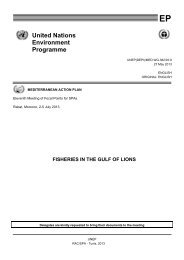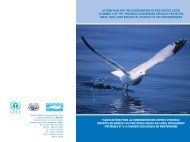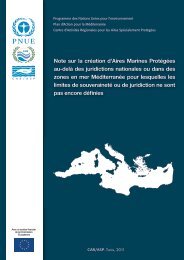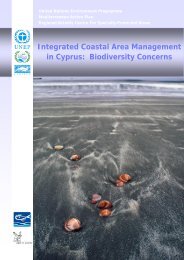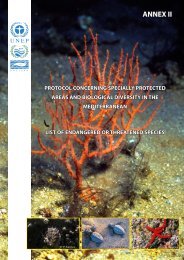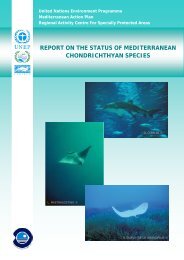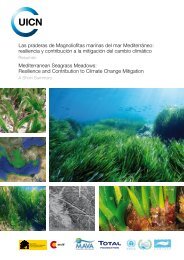Proceedings of the Second Mediterranean Symposium on Marine
Proceedings of the Second Mediterranean Symposium on Marine
Proceedings of the Second Mediterranean Symposium on Marine
You also want an ePaper? Increase the reach of your titles
YUMPU automatically turns print PDFs into web optimized ePapers that Google loves.
Here, we will firstly delineate what encompasses <str<strong>on</strong>g>the</str<strong>on</strong>g> popular noti<strong>on</strong> <str<strong>on</strong>g>of</str<strong>on</strong>g> plant. Then we will<br />
define biodiversity, especially alpha and gamma species diversity, since some forms <str<strong>on</strong>g>of</str<strong>on</strong>g><br />
impact may increase alpha diversity while reducing gamma diversity. We will rank human<br />
impacts according to <str<strong>on</strong>g>the</str<strong>on</strong>g> time necessary for <str<strong>on</strong>g>the</str<strong>on</strong>g> impact to become reversible. Clearly,<br />
those forms <str<strong>on</strong>g>of</str<strong>on</strong>g> impact which are irrever-sible at human scale (e.g. coastal development,<br />
species introducti<strong>on</strong>, species extincti<strong>on</strong> and global warming) are a much greater cause for<br />
c<strong>on</strong>cern than those which are reversible within a few years (e.g. most types <str<strong>on</strong>g>of</str<strong>on</strong>g> polluti<strong>on</strong><br />
and oil spills). Here, we will <strong>on</strong>ly address three forms <str<strong>on</strong>g>of</str<strong>on</strong>g> human irreversible impact:<br />
coastal development, introduced species and global warming. Finally, we will leave aside<br />
<str<strong>on</strong>g>the</str<strong>on</strong>g> well known decline <str<strong>on</strong>g>of</str<strong>on</strong>g> <str<strong>on</strong>g>the</str<strong>on</strong>g> Posid<strong>on</strong>ia oceanica seagrass and poorly documented<br />
problems such as <str<strong>on</strong>g>the</str<strong>on</strong>g> decline <str<strong>on</strong>g>of</str<strong>on</strong>g> epiflora <str<strong>on</strong>g>of</str<strong>on</strong>g> <str<strong>on</strong>g>the</str<strong>on</strong>g> coastal detritic community, to focus <strong>on</strong><br />
two case studies, Cystoseira forests and Lithophyllum byssoides rims.<br />
THE NOTION OF VEGETATION<br />
The noti<strong>on</strong> <str<strong>on</strong>g>of</str<strong>on</strong>g> plant kingdom versus animal kingdom dates back to Karl v<strong>on</strong> Linnaeus, two<br />
and a half centuries ago. He empirically ga<str<strong>on</strong>g>the</str<strong>on</strong>g>red within his plant kingdom flowering<br />
plants (Phanerogama, now Magnoliophyta) and Cryptogama (ferns, mosses, fungi and<br />
algae). Scientific findings in <str<strong>on</strong>g>the</str<strong>on</strong>g> fields <str<strong>on</strong>g>of</str<strong>on</strong>g> anatomy, cytology, biochemistry, biology and<br />
finally molecular biology invalidated this classificati<strong>on</strong> between <str<strong>on</strong>g>the</str<strong>on</strong>g> end <str<strong>on</strong>g>of</str<strong>on</strong>g> <str<strong>on</strong>g>the</str<strong>on</strong>g> 19th<br />
century and <str<strong>on</strong>g>the</str<strong>on</strong>g> 1980s. Surprisingly, this customary classificati<strong>on</strong> is still in use in many<br />
text books and is still taught in most universities in <str<strong>on</strong>g>Mediterranean</str<strong>on</strong>g> countries.<br />
Teachers ei<str<strong>on</strong>g>the</str<strong>on</strong>g>r actually ignore a <strong>on</strong>e century suite <str<strong>on</strong>g>of</str<strong>on</strong>g> discoveries, or are aware that some<br />
changes happened but claim that "new classificati<strong>on</strong> is too complicated and <str<strong>on</strong>g>the</str<strong>on</strong>g>refore<br />
cannot be understood by students" (by students? or by <str<strong>on</strong>g>the</str<strong>on</strong>g>mselves?) and that "it is<br />
changing over time, so that it is preferable to wait until it is would be stabilized before<br />
teaching it". The latter argument is <str<strong>on</strong>g>of</str<strong>on</strong>g> course irrelevant. Firstly, <str<strong>on</strong>g>the</str<strong>on</strong>g> main features <str<strong>on</strong>g>of</str<strong>on</strong>g> <str<strong>on</strong>g>the</str<strong>on</strong>g><br />
modern classificati<strong>on</strong> have been more or less stabilized for at least two decades.<br />
<str<strong>on</strong>g>Sec<strong>on</strong>d</str<strong>on</strong>g>ly, changing likely hypo<str<strong>on</strong>g>the</str<strong>on</strong>g>ses into more likely hypo<str<strong>on</strong>g>the</str<strong>on</strong>g>ses c<strong>on</strong>stitutes a general<br />
characteristic <str<strong>on</strong>g>of</str<strong>on</strong>g> Science: stabilizati<strong>on</strong> will never occur. Do geneticists wait decades to<br />
teach new noti<strong>on</strong>s <strong>on</strong> <str<strong>on</strong>g>the</str<strong>on</strong>g> plea that <str<strong>on</strong>g>the</str<strong>on</strong>g>y will c<strong>on</strong>tinue to be improved over time?<br />
ACTES DU DEUXIEME SYMPOSIUM MEDITERRANEEN SUR LA VEGETATION MARINE (ATHENES, 12-13 DECEMBRE 2003)<br />
35




